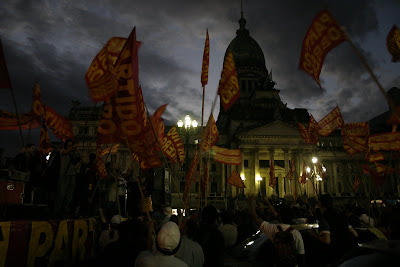
Normal, every day life on La Plaza Congreso is much like it is in any other urban plaza in cities throughout the world.
Children play fútbol during the afternoons. Lovers kiss on park benches into the night. Street people sleep in the grass, vendors peddle ice cream, business people walk briskly in all directions and traffic never ceases to buzz, honk and tear around the one way streets that surround the congressional plaza.
On the evening of October 28th, however, the traffic in La Plaza de los Dos Congresos was absent. No thundering buses to flatulate black smoke out onto the sidewalks. No honking taxis or impatient motorcycles zipping between lanes. People gently meandered down the middle of the streets without the usual automotive chaos.
It is not uncommon to pass large steel baracades when walking by the congressional building on the west end of the rectangular park. In fact, most government buildings in Buenos Aires are surrounded on all sides by large, cold, grated steel baracades.
But on this particular Sunday evening, the entire plaza was cordoned off. One block out on every single street stemming out from the plaza in each direction was a police baracade, made up either of the familiar cool blue mobile steel walls or just an officer next to his squad car. On the streets close to the congresional building itself, even pedestrians were not allowed through the gates.
"May I pass through?" I asked an officer at the gate in broken spanish.
"Where to?"
"To the café," I pointed up ahead, inside the baracade.
"No," he told me, with an ever so slight chuckle.
In the four days prior to the Sunday election day, I had seen two rallies in the Congresional plaza. They were animated, well attended and very, very lively. Neighbors had told me that the plaza was very popular for "parties."
 The second rally of the week rolled into town two days before the election behind a large flatbed truck carrying an armada of drummers, flag wavers and what sounded like gun shots but proved only to be firecrackers. Later, in front of a chanting, flag waving, smoke bombing crowd the voice of Néstor Pitrola, one of 14 canidates in the Argentine presidential election, crackled out over the plaza via loudspeakers.
The second rally of the week rolled into town two days before the election behind a large flatbed truck carrying an armada of drummers, flag wavers and what sounded like gun shots but proved only to be firecrackers. Later, in front of a chanting, flag waving, smoke bombing crowd the voice of Néstor Pitrola, one of 14 canidates in the Argentine presidential election, crackled out over the plaza via loudspeakers.In the end, Pitrola and all other 12 canidates never had a chance. Cristina Kirchner, the wife of current Argentine President Néstor Kirchner, pretty much had things locked up from the getgo.
Described by many locals as the "best of the bad," the Kirchner regime pulled Argentina out of economic hell, and the former first lady wiped up in the wake of her husband´s popularity with a 43% victory.
But on election night, the cold blue steel baracades were nonetheless set in place at a three block radius around the congresional building. Aside from a few bullhorn toting soapboaxers or the occasional horn honking bicyclist, the plaza saw little action thanks to the police presence.
After being refused passage through the baracade by the police, I walked around the block trying to get to my favorite diner for some empanadas and pizza slices. Suddenly, as I watched people walk past the baracade it dawned on me why alcohol had been illegal since 10 p.m. the night before.
While local porteños say the police presence was "just a precaution," it b rings to light the passion of the Argentine people. They tear seats out and destroy stadiums at fútbol matches, they rally hard for political causes - when they show up for a rally they often carry sticks. Political revolution is not too far in the past of this country, and some of their most infamous figures are revolutionaries.
rings to light the passion of the Argentine people. They tear seats out and destroy stadiums at fútbol matches, they rally hard for political causes - when they show up for a rally they often carry sticks. Political revolution is not too far in the past of this country, and some of their most infamous figures are revolutionaries.
 rings to light the passion of the Argentine people. They tear seats out and destroy stadiums at fútbol matches, they rally hard for political causes - when they show up for a rally they often carry sticks. Political revolution is not too far in the past of this country, and some of their most infamous figures are revolutionaries.
rings to light the passion of the Argentine people. They tear seats out and destroy stadiums at fútbol matches, they rally hard for political causes - when they show up for a rally they often carry sticks. Political revolution is not too far in the past of this country, and some of their most infamous figures are revolutionaries.If the Kirchner victory hadn´t been so well predicted who knows, maybe those cold, hard, steel baracades might have been tested.
- AC
PHOTOS: A dubious night sky backs the congressional building as a backdrop to a rally for Néstor Pitrola days before the election, top. Pitrola speaks to the press at the rally, middle. A police baracade one block from Plaza Congreso on election night, bottom. - AC






















































1 comment:
I enjoyed your first hand impressions. We've heard about the election mainly on the radio and in the paper. Our media has been comparing the couple to the Clintons. Nice photos!
Post a Comment